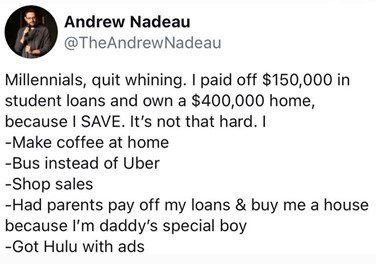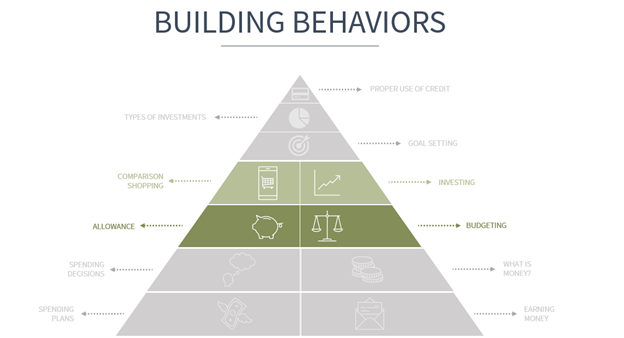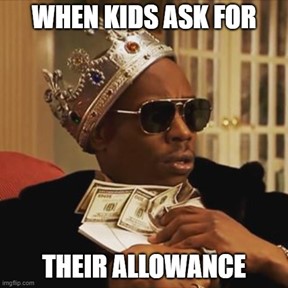
StonebridgeFOCUS | Building Better Behaviors (Ages 10-14)
I don’t have a lot of pet peeves. But if you tell me that Frappuccinos® are what holds back Millennials from financial freedom, I’ll throw down.
Don’t get me wrong, it is an expensive habit if you’re doing it everyday, but it’s an oversimplification of a greater problem, which is that money management and financial literacy have not been societal priorities.
Only 24 percent of millennials demonstrate the ability to understand basic financial concepts[i].
Though Gen X is closer to retirement than Millennials, they have about the same amount of money saved[ii].
Nearly 60 percent of parents report giving their kids financial help in the past year[iii].
And 63 percent of Millennials feel anxious when thinking about their financial situation[iv].
This isn’t good and isn’t a quick fix. We’re not on a speedboat that can quickly turn things around, we're on the Titanic. To break these patterns, it will take a generational commitment to build solid financial behaviors on top of a sturdy financial foundation.

After creating a strong financial foundation in your child's life, parents can shift their focus to building better behaviors, which include:
- Integrating an allowance into a spending plan
- Budgeting
- Comparison shopping
- Saving and investing
Integrating an allowance into a spending plan marries the two variables of a budget: income and expenses. An allowance can be used to test the stability of a spending plan and determine how well a child has grasped the main money categories (“earn”, “spend”, “save”, “share”, and “invest”). An allowance needs to be properly structured with specifics and be part of a larger conversation about money. You should provide clarity on the amount of the allowance and what tasks are expected to earn it.
One word of caution: implementing an allowance improperly can lead to negative outcomes. Kids who receive unconditional allowances, or get money for doing nothing, can lead to them being less financially literate than kids that don’t receive any allowance[v]. If you’re having trouble determining a starting point for an allowance, we’re happy to provide some additional resources.
Budgeting has a negative connotation primarily because people are afraid of their own spending behavior or potential judgment by others. However, budgeting is a natural progression once an allowance is established, and it reinforces basic math skills to balance a spending plan. The importance of recordkeeping cannot be overstated, as this equips kids to gain a better understanding of behavior outcomes and helps them evaluate trade-offs.

Comparison shopping helps kids carefully evaluate alternatives before making a purchase but can also be used to teach how to scrutinize advertising messages that may influence the decision-making process. Children are exposed to approximately 161 TV ads a week, according to a 2017 study by the Advertising Standards Association[iv]. Typical advertising techniques focus on status, peer approval, or even unfinished comparisons (use of phrases such as, “works better in poor driving conditions!”). Works better than what?
Comparison shopping arms children with skills to become more informed consumers, develop healthy spending habits, identify misleading advertisements, and avoid spending traps.
Saving and investing is a preamble to goal setting by differentiating money set aside based on time horizon and purpose. Part of learning about money management includes knowing where to put savings and evaluating the options (savings account vs. money market account vs. CD).
You can start by talking about interest rates at the bank and differences between savings account and a CD. Start the investing conversation by explaining that stock represents ownership in a company. One way to get kids engaged is to tie it back to things they are interested in. If they love McDonald’s or are obsessed with their iPhone, look up the stocks (tickers are MCD and AAPL, respectively). The point of the exercise is to root it back into their interests and weave in some small lessons. We've all heard about the power of compound interest, but need to acknowledge the power of compound learning.
At Stonebridge, our job isn’t just to help our clients accomplish their personal life and wealth goals or achieve their greatest financial potential, but also to empower them to become confident and fearless investors. In our view, this means providing resources to prepare you and the next gen for multigenerational wealth that is only sustainable when the lines of communication are open, a strong financial foundation is cemented, and constructive behaviors are built.
If you’d like more information or additional financial literacy resources for teenage children, please feel free to reach out and we’d be delighted to assist. Here are a couple of freebies that cover a variety of areas:
Financial Football | Visa and the National Football League have teamed up to create Financial Football, a fast-paced, interactive game that engages students while teaching them personal finance skills. The latest release features 3D graphics and game-changing opportunities with audibles, blitzes and long yardage plays.
The Payoff | Play the role of Alex or Jess, two up-and-coming video bloggers who are preparing for a life-changing video competition while managing their finances and handling unexpected events. In the immersive game, developed by Visa, help Alex and Jess make smart financial decisions within the tight three-day deadline and complete their video for the competition.
Happy Teaching,
Tyler Martin, CFP®, CPWA®
[i] PWC | Millennials & Financial Literacy
[ii] Walden University | Differences in Financial Literacy Across Generations
[iii] PEW Research Center | Majority of Americans Say Parents Doing Too Much for Their Young Adult Children
[iv] TIAA Institute | Millennials and Money
[v] Business Insider | Giving Kids An Allowance Does More Harm Than Good
[vi] The Drum | The number of harmful ads that kids are exposed to has declined, says ADA

